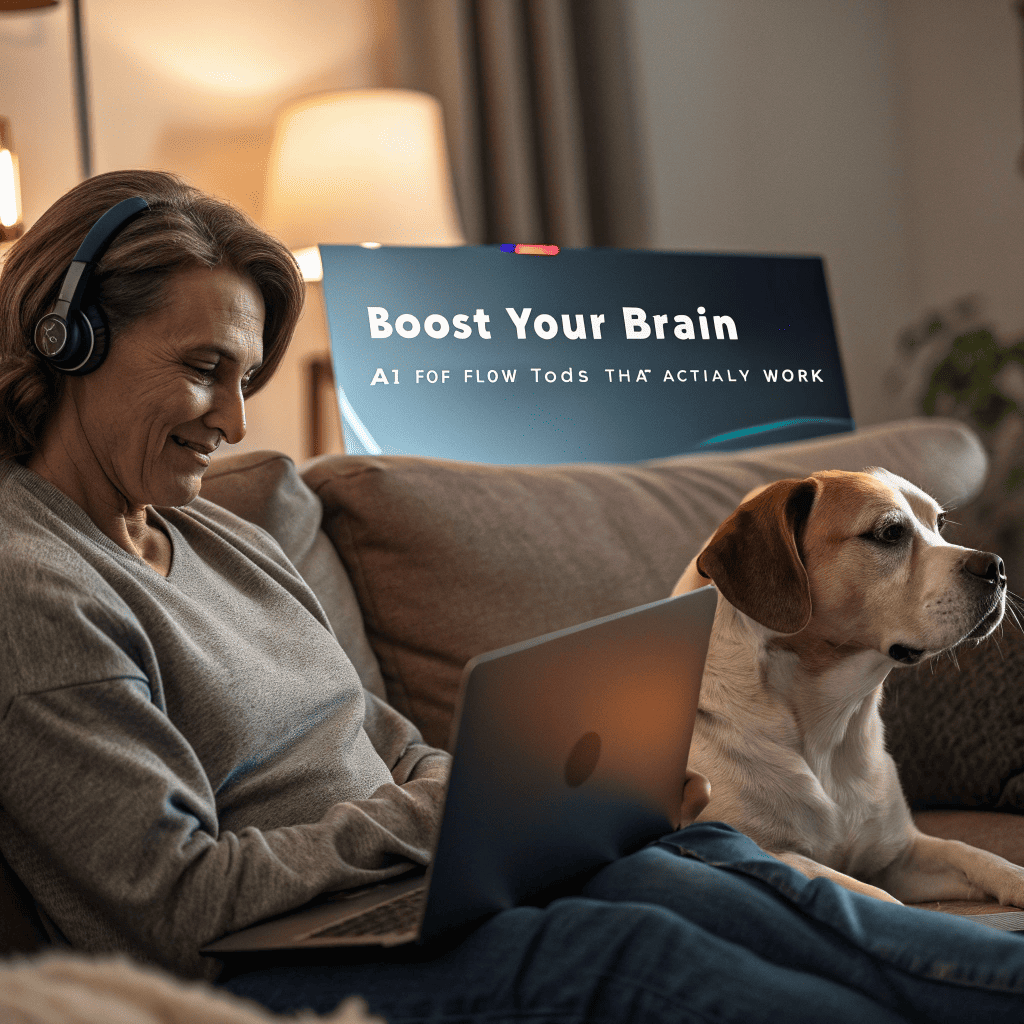Physical Address
304 North Cardinal St.
Dorchester Center, MA 02124
Physical Address
304 North Cardinal St.
Dorchester Center, MA 02124

In a world wired for distraction, achieving deep, focused work has become a rare and valuable skill. Whether you’re a creative, a professional, or simply someone looking to reclaim mental clarity, you’ve probably heard of the flow state—that sweet spot where focus, performance, and satisfaction intersect.
But getting there isn’t always easy.
That’s where artificial intelligence (AI) is quietly revolutionizing how we work. Today, a new wave of AI-powered tools is designed to help us enter and sustain flow more easily, making mental fatigue and cognitive overload feel like problems of the past.
This article explores how these tools actually work, why they matter, and how they can help you boost your brain in practical, everyday ways. For a broader perspective on this evolving field, see our pillar article: AI For Flow: Can Smart Tech Really Improve Focus?
Flow, first defined by psychologist Mihaly Csikszentmihalyi, is a mental state where we’re fully immersed in an activity. Time seems to disappear, distractions fade, and we operate with a kind of effortless intensity. Studies show that people in flow are not only more productive but also feel more fulfilled and engaged.
However, achieving flow in today’s digital environment—filled with pings, multitasking, and mental noise—has become increasingly difficult.
This is where AI offers something uniquely valuable: the ability to adapt to your personal rhythms, clear away friction, and guide your brain into optimal performance mode.
What makes these tools so effective isn’t just their smart features, but how they interact with your cognitive patterns. Here are three key ways they assist in reaching the flow state:
AI tools can learn your patterns—when you’re most alert, when you start losing focus, and which tasks require the most brainpower. With this insight, they can automatically mute distractions, dim notifications, or even schedule focus sessions for when your brain is naturally at its peak.
Some advanced tools sync with wearable devices to monitor your heart rate, brainwaves, or breathing. When stress spikes or focus drops, the system nudges you to take a break, stretch, or shift gears—before burnout kicks in.
We often underestimate how much brainpower is lost on repetitive tasks. AI tools that automate admin work, organize your to-do list, or streamline your calendar help preserve mental energy for meaningful work—an essential condition for flow.
Let’s look at the kinds of AI-powered tools that are making the biggest impact on real users:
These apps go beyond basic time-tracking. They adapt your workday based on your actual performance trends.
Why they work: They simplify task-switching and protect your most valuable mental windows by helping you commit to deep work when you’re most capable of it.
Think headbands, rings, or wrist devices that provide live data about your mental state. Some even use brain-computer interface (BCI) tech to guide you gently back to focus when you stray.
Why they work: They tap into your physiology to help you understand and manage your cognitive energy in real time.
AI-powered platforms that tailor lessons to your skill level and learning style, keeping you challenged but not overwhelmed—a perfect recipe for flow.
Why they work: Flow thrives in the space between boredom and anxiety. These tools keep you right in that sweet spot.
These tools learn from your habits and suggest optimal times to tackle specific types of tasks, even accounting for your energy dips and spikes throughout the day.
Why they work: They minimize decision fatigue and support rhythm-based productivity, making flow more predictable and repeatable.
At the neurological level, flow involves a temporary reconfiguration of brain activity: the prefrontal cortex quiets down (which reduces self-criticism), dopamine levels rise (boosting motivation), and the brain operates in a more fluid, efficient way.
AI tools help support this by:
In short, they don’t create flow for you—but they set the perfect stage for it to unfold.
For a deeper dive into how AI is transforming the way we work, learn, and grow, don’t miss our pillar article: AI For Flow: Can Smart Tech Really Improve Focus?
The promise of AI in personal development isn’t about replacing human focus—it’s about supporting and amplifying it. The best AI flow tools don’t just block distractions or organize tasks; they empower you to take control of your attention, energy, and creativity.
If you’re serious about doing your best work without burning out, integrating these tools into your daily life might be the smartest move you can make.
After all, your brain is your greatest asset—and now, you’ve got AI to help it work at its best.